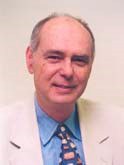Posted: June 7, 2019
The inspiration behind a person's philanthropy can come from a variety of sources. For alumnus Dr. Roger Simon, it stems from two places: the Penn State Department of Entomology and his father, Sam Simon.

Dr. Roger Simon established the Samuel Pancoast Simon Professorship in Entomology in honor of his father.
The inspiration behind a person's philanthropy can come from a variety of sources. For alumnus Dr. Roger Simon, it stems from two places: the Penn State Department of Entomology and his father, Sam Simon.
In an effort to give back to the department and to honor his father, Simon has pledged a $1 million estate gift to establish the Samuel Pancoast Simon Professorship in Entomology, which can provide funding for research expenses, graduate and undergraduate student support, salary supplementation, travel and education expenses, and more.
"The entomology department had faith in me and invested in me," said Simon, professor of medicine and neurobiology at the Morehouse School of Medicine. "This is an opportunity for me to provide a token repayment in the name of my beloved father, Samuel Pancoast Simon. I've been the recipient of a number of these endowments over the years, and they can be game changers in an academic career."
The Samuel Pancoast Simon Professorship will be the third named professorship in the Department of Entomology, which is part of Penn State's College of Agricultural Sciences. The previous two endowments have been instrumental in helping the department recruit and retain outstanding faculty, according to Dr. Gary Felton, department head and professor of entomology.
"Our aim is to be the top entomology department in the world, and named professorships are one of the most important tools toward achieving this goal."
Simon's undergraduate studies began at the Abington campus, known as Ogontz at the time, before he attended the University Park campus for his junior and senior years. After graduating in 1964 with a bachelor of science degree in zoology and entomology, Simon spent two years with the U.S. Army. He initially wanted to pursue medical school following his years in the service, but he applied to the graduate zoology program at Penn State to become a high school biology teacher.
Simon ultimately found a place as a graduate student in entomology. Under Dr. Allan Benton, he collected venom from wasps and hornets and co-wrote two papers on the process. The ultimate research goal was to find the presumed venom protein that caused anaphylaxis after a sting. Simon would eventually go on to perform the first electrophoretic separation of the proteins in the venom of yellow jackets.
The groundbreaking work Simon conducted as a graduate student eventually gained him admission to medical school at Cornell. In his early years of medical school, Simon missed the excitement of working in a laboratory and soon found himself in a neuroanatomy research lab. His work garnered him the student research prize in neurobiology and started him in an academic research career.
For his desire to learn, Simon credits his father, a man he says was "always reading and studying." While his father would never attend college due to the Great Depression, he instilled in Simon a lifelong love of learning and discovery, a love he will now be able to share with future Penn State faculty members to further their contributions in teaching, research and service.
"Having alumni of the department provide such gifts is particularly gratifying because it means the donors place high value on their education and experience during their time at Penn State and in the Department of Entomology," said Felton. "A named professorship is one of the highest honors in academia, and Penn State and the department will be able to use the professorship to reward and retain our best faculty or to recruit top professors from other institutions across the world."
The Penn State College of Agricultural Sciences represents the foundation of Penn State and its land-grant mission to serve the public good. To fulfill that mission for a new era of rapid change and global connections, the University is pursuing "A Greater Penn State for 21st Century Excellence," a fast-paced campaign focused on the three key imperatives of a twenty-first-century public university: Open Doors, Create Transformative Experiences, and Impact the World. Through teaching, research, and Extension, and because of generous alumni and friends, the College of Agricultural Sciences is able to offer scholarships to one in four students, create life-shaping opportunities, and make a difference in the world by fueling discovery, innovation, and entrepreneurship. To learn more about supporting the college, visit the College's Giving website. Information about the campaign is available at greaterpennstate.psu.edu.
Office of Development and Alumni Relations
Address
240 Agricultural Administration BuildingUniversity Park, PA 16802
- Email agdevelopment@psu.edu
- Office 814-863-1373
Office of Development and Alumni Relations
Address
240 Agricultural Administration BuildingUniversity Park, PA 16802
- Email agdevelopment@psu.edu
- Office 814-863-1373

